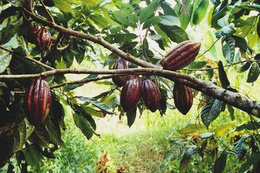Business and Biodiversity: Ritter Sport

Ritter Sport
Commitment

Are you interested in what links chocolate production and environmental protection? Ritter SPORT has been interested in this for many years and is actively involved in the preservation of biodiversity.
For years now, Ritter SPORT has anchored environmentally friendly action in its mission statement. The company considers the protection of natural resources, which includes the preservation of biological diversity, to be one of the most important challenges of the future.
As a member of the 'Biodiversity in Good Company' Initiative, and for the implementation of its Leadership Declaration, Ritter SPORT has agreed to evaluate its activities and their effects on biodiversity. The knowledge gained will be passed on to the management board and will serve as the basis for possible further activities.
With its Code of Conduct, the chocolate manufacturer informs its suppliers of the corporate goals regarding the protection of species that are incorporated into their activities. Furthermore, the company continuously examines cooperation possibilities with non-governmental organisations and the economic benefits of such a cooperation.
In order to make the success of Ritter SPORT in the fields of biodiversity and sustainability visible, the company focuses on key areas. Based on the progression of the projects in these key areas, the development is analysed and, if deemed necessary, adjusted every two to three years.
Benefit
The promotion of sustainable cocoa cultivation and the use of renewable energy sources are the most important topics for Ritter SPORT for the protection of biodiversity.
Sustainable cultivation of cocoa
CACAONICA
In recent years, the commitment of our company made it possible to expand the cultivation area of agroforestry cocoa in Nicaragua. The introduction of this environmentally friendly form of agriculture was achieved with the help of consultancy work (provision of materials as well as training in sustainable cocoa cultivation), the development of a cocoa purchasing and drying station, and by means of bonus payments on top of the current world market price. This cooperation, which has now existed for 25 years, has developed very positively. Today, approximately 3,500 cocoa farmers in roughly 20 cooperatives take part.
The delicate cocoa trees need to be surrounded by large shade trees, which protect them from the sun. Agroforestry does not create monocultures, but rather species-rich mixed cultures. Furthermore, a significant amount of firewood can be saved through the development of central drying stations in the cooperatives and through the introduction of energy-efficient drying methods. In addition, deforestation is minimised and the natural habitats of numerous animal and plant species are sustained.
Sustainable cocoa cultivation therefore makes sense for all involved: for the farmers, the rainforest and for Ritter SPORT.
EL CACAO
In 2012, the company marked a new chapter in its commitment to sustainability in Central American Nicaragua. Ritter SPORT purchased land in eastern Nicaragua and is now getting involved in the sustainable cultivation of cocoa. The objective here, too, is ecologically and socially sustainable cocoa cultivation for Ritter SPORT chocolate.
With its 2,500 hectares, this is one of the largest continuous cocoa cultivation areas in the world. The cultivation adheres to standards that make a certification according to UTZ Certified or Rainforest Alliance possible. The first harvest is planned for 2017.
A plantation with model character was created here from fallow load, and is being reforested according to the standards of agroforestry agriculture. Maintaining existing forests and swamplands as well as building animal bridges will safeguard the biodiversity of the region. The cultivation of the land is based on the principles of integrated agriculture. This includes energy efficiency, the prevention of climate-relevant emissions, sustainable soil fertility and biodiversity.
In addition to ecological aspects, it was also the social issues of cocoa cultivation that moved RITTER SPORT to become active here. High safety standards, medical treatment, extensive educational measures and remuneration well above the Nicaraguan minimum wage create fair and safe working conditions.
Alternative energy sources
Not only does Ritter SPORT profit from the increased use of alternative energy sources, the environment does as well. Heated water from the cooling plants is created during the production of conventional electricity and is fed into the rivers. This results in dying fish and destructive algae growth. The emissions created from energy production increase the greenhouse effect, contribute to global warming, and thus alter numerous ecosystems, which in turn permanently destroys the habitats of many species. The result: a massive reduction in flora and fauna species.
Therefore, the company has relied on the purchase of green energy, the in-house thermal power station and a photovoltaic system for many years. In future, Ritter SPORT would like to continue to reduce its emissions and is currently investing in the construction of a high-capacity thermal power station, which will be put into operation in 2016.
All of Ritter SPORT’s sustainable and ecological efforts are ultimately being impressively linked together: while using green power, sustainably grown cocoa is being turned into chocolate, and then packaged in a fully recyclable polypropylene wrapper.
